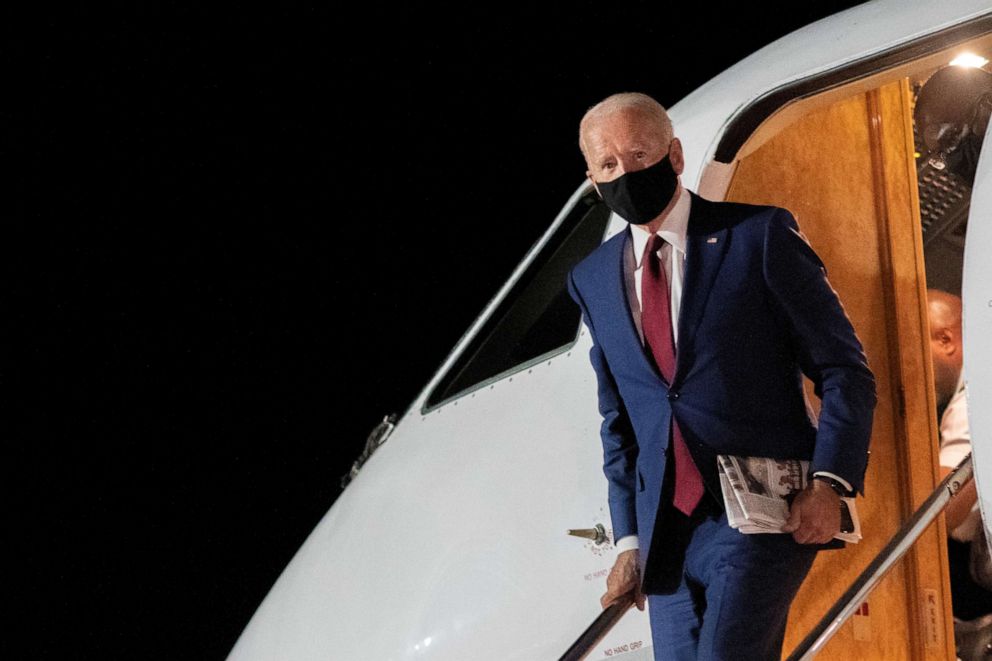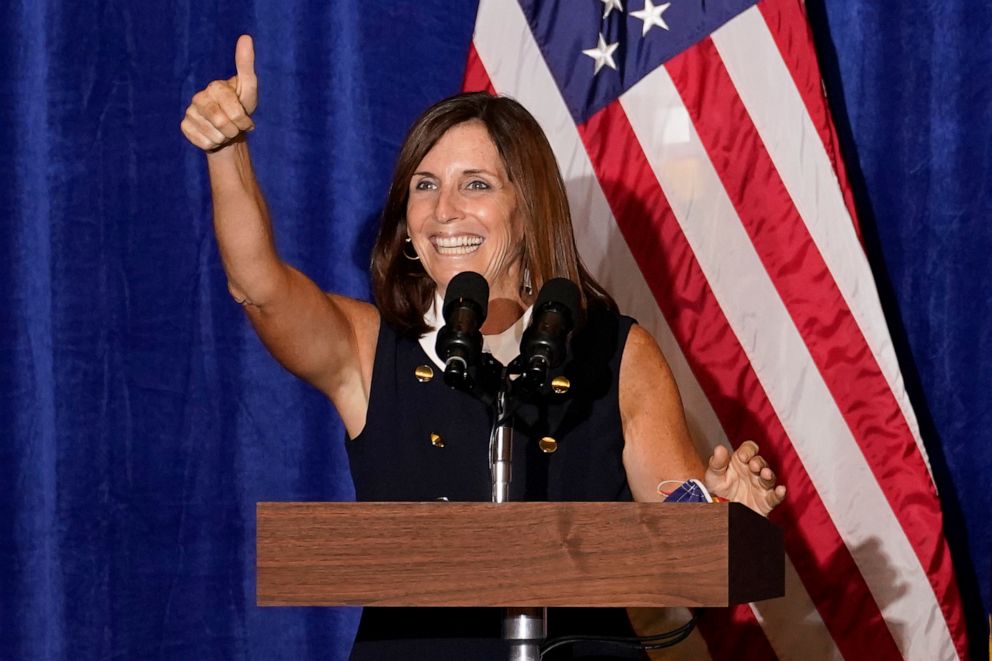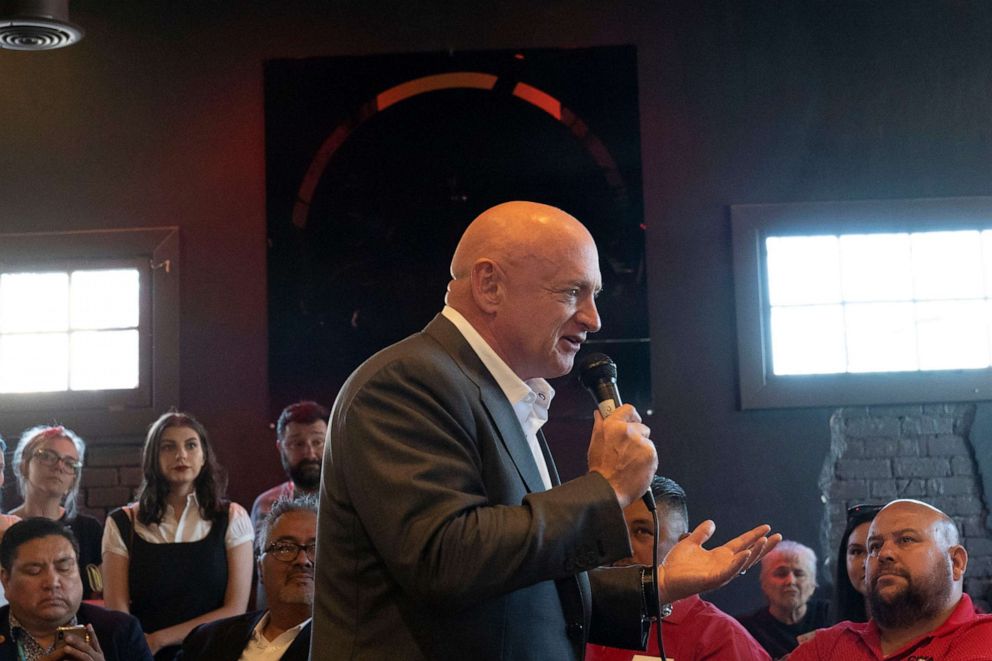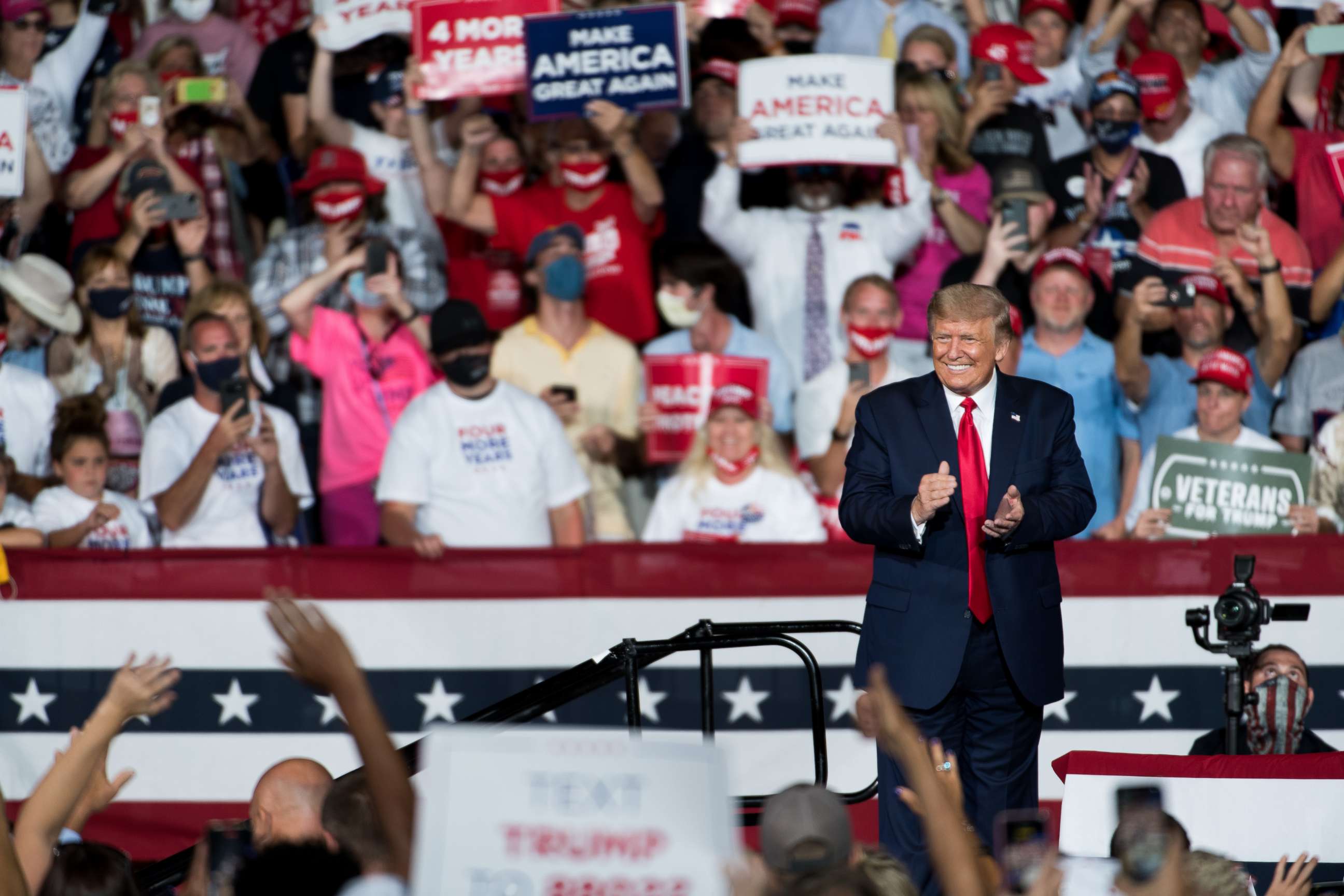Trust on the economy bolsters Trump in oh-so-close Florida and Arizona: POLL
Both contests are closely contested in the latest ABC/Washington Post polls.
Donald Trump's economic argument pushes back against Joe Biden's pitch that he can better handle the coronavirus pandemic in Florida and Arizona alike, producing closely divided presidential contests in both states in new ABC News/Washington Post polls.
The critical Arizona Senate race, where the Democrats are pinning their hopes for control of the chamber, is also essentially tied in the new survey there.
See PDF for full results, charts and tables.
Registered voters in Florida split almost precisely evenly for the president, 47%-48%, Trump versus Biden, while it's 51%-47% among those most likely to vote. In Arizona, the presidential race stands at 47%-49% among registered voters and 49%-48% among likely voters. None of these differences is statistically significant.
Ditto for the Arizona Senate contest, where a 50%-45% match among registered voters between Democrat Mark Kelly and incumbent Republican Martha McSally is a still-tighter 49%-48% among likely voters.
The result in Florida befits its swing-state status, with sharp differences across regions and demographic groups. A challenge for Biden is his tepid 13-point lead among Hispanics in the state (using registered voters for an adequate sample size); Hillary Clinton won Florida Hispanics by 27 percentage points in 2016, yet narrowly lost the state. Trump also does better than elsewhere in Florida among college-educated whites -- though far better still with their non-college counterparts.
In Arizona, the closeness of the contest is a different story, given that the state has voted for a Democratic candidate for president just once since 1952 -- in 1996. There, Biden leads 61%-34% among Hispanic registered voters, leads among independents and is stronger than in Florida with college graduates. Trump makes it back by way of an advantage in party loyalty; among Arizona likely voters, Republicans outnumber Democrats by 7 points.
In both states, while Biden is strong among moderates, fewer liberals appear as likely voters compared with the 2016 exit polls. Conservatives account for nearly 4 in 10 voters; liberals, about 2 in 10.
Interviews for this survey, produced for ABC News by Langer Research Associates, were conducted Sept. 15 to 20, overlapping the death of U.S. Supreme Court Justice Ruth Bader Ginsburg. There were no significant differences in partisan vote preferences before and after her death.

Issues
The economy stands out as key to Trump's competitiveness. Even in the midst of a pandemic-fueled recession, registered voters in Florida trust Trump over Biden to handle the economy by 11 points, 52%-41%, and in Arizona by 15 points, 56%-41%. Preference on the economy was more closely divided in ABC News/Washington Post polls in Wisconsin (Trump +5) and Minnesota (Biden +3) last week.
Indeed, Trump has majority approval in both states for his handling of the economy -- 54% among registered voters in Florida and 57% in Arizona. That compares with his approval overall, 47% in both states, and for handling the coronavirus outbreak, 45% in both.
Trump's advantage on the economy compares with a far closer call in trust to handle the pandemic -- Biden +5 points in Florida and +4 in Arizona, neither a statistically significant difference. In Minnesota, Biden led by 22 points in trust to handle the pandemic and led Trump by 16 points in vote preference overall. (Biden was +7 on the pandemic in Wisconsin, where the overall contest was close.)
Trump does less well than he may wish in trust to handle crime and safety; he's just +4 points against Biden on this issue in Florida and Arizona alike, another nonsignificant gap despite Trump's efforts to make it a wedge.
Then again, the division also is close on handling health care, more typically a Democratic strength. It's the economy, moreover, that prevails as the top issue -- 31% in Florida and 33% in Arizona call it the single most important issue in their vote, ahead of the pandemic in both states. More than 8 in 10 economy voters favor Trump, while more than 85% of those most focused on the pandemic favor Biden.
Economy ratings aren't particularly robust; fewer than half in both states, 46% in Florida and 42% in Arizona, rate it positively. The political argument is more about the level of Trump's responsibility for the downturn, and, particularly, who's best suited to move ahead. The question is the same for the pandemic response; as things stand, 57% in both states are worried about catching the coronavirus.
As in the previous states and nationally, views of the economy's condition and worries about catching the virus both independently predict candidate support, even controlling for partisanship, ideology and race/ethnicity. Were either economic or pandemic views to shift in the campaign's closing weeks, the impact could be decisive.
Another issue also divides these electorates: Fifty-one percent in Florida and 52% in Arizona say they support recent protests against police treatment of Black people. That's more than the number who are opposed -- 42% in Florida and 44% in Arizona. Roughly 8 in 10 critics of these protests support Trump; about as many protest supporters favor Biden.
Voting plans
Who shows up, of course, is more decisive than anything, and on this the complexities of a pandemic election are evident. Majorities in Arizona (64%) and Florida (56%) plan to vote early or absentee, not on Election Day; that's much higher than in Wisconsin (44%) or Minnesota (39%). Mail-in voting is especially prevalent in Arizona, where it's more established; in Florida, more plan in-person early voting.
The differences in candidate choice are dramatic. Among likely voters who plan to cast their ballot traditionally -- in person on Election Day -- more than 7 in 10 support Trump. Among the majorities that intend to vote early, 6 in 10 or more support Biden.
Both states typically do have high levels of early and absentee voting. The questions: Can Biden's camp encourage a high enough level of pre-Election Day turnout this year? Will pandemic conditions be such that Trump voters feel adequately secure to vote in person on Election Day? Again, the outcome may hinge on the answers.
Senate
In the equally tight Senate special election in Arizona, Kelly has a 13-point edge among independent likely voters; he also has 53% support from women, while McSally has 54% from men. Kelly prevails among moderates and in the cities -- particularly among urban women, with a 38-point margin versus an even split among urban men.

McSally, who was appointed to the seat in 2018, leads in the suburbs. She's closely aligned herself with Trump, and wins a nearly unanimous 93% of likely voters who approve of the president's overall job performance. She, like Trump, has a broad advantage among voters prioritizing the economy or crime and safety in their presidential vote.
Both are former military officers -- McSally was an Air Force colonel, Kelly was a Navy captain. McSally leads 56%-42% among likely voters from households with a military member or veteran, a more GOP-leaning population.
Kelly -- like Biden -- is ahead by a wide margin among those who identify the coronavirus outbreak, health care or the equal treatment of racial groups as the most important issue in their vote. Indeed, the Senate race looks much like an analog of the presidential contest. Ninety-four percent of Biden supporters favor Kelly; 93% of Trump's back McSally.

Another similarity: McSally wins 70% support from likely voters who plan to vote in person on Election Day. Among those planning to vote early or absentee, 61% prefer Kelly.
Groups
In the presidential contest, while there's a gender gap in both states, Biden's support from women is comparatively muted -- 52% in Florida and Arizona alike, compared with 60% in Wisconsin and 67% in Minnesota last week. (It was 58% in a national ABCNews/Washington Post poll last month.) That said, for these states, it's about on par; Clinton won 50% of women in Florida and 49% in Arizona in 2016.
Sixty percent of white likely voters in Florida favor Trump, as do 54% in Arizona -- both also similar to 2016. In Florida, beyond his less-than-desired support from Hispanics, 52%, Biden comes back with 86% among Blacks. (Both results are among registered voters for adequate sample sizes.)
Biden is comparatively weak in Florida among college-educated white women. A mainstay for him elsewhere, he wins just 53% in this group, compared with 61% in Arizona, and, last week, two-thirds in Wisconsin and three-quarters in Minnesota. That said, state context is important: Trump won college-educated white women in Florida by a broad 60%-37% four years ago.
The closeness of the race in Florida is underscored by preferences among independent likely voters, often a key swing group: 48% for Biden, 47% for Trump. It's a different story in Arizona, where Biden leads by 19 points among independents. Notable, too, are college-educated likely voters in Arizona; they divided evenly in 2016, but favor Biden by 19 points now. It's close because Trump has a 12-point edge among non-college likely voters, and there are more of them.
In a perhaps surprising result, Biden has shrunk his longstanding enthusiasm gap with Trump in Florida. Seventy-two percent of Trump's supporters in the state say they're very enthusiastic about their choice, as do 67% of Biden's. In Arizona, by contrast, Biden has a 25-point enthusiasm deficit.
Regions
Results range widely across Florida's political geography, from 66% support for Trump in the reliably Republican north and Panhandle to 64% for Biden in Miami and the Keys. Trump is up 15 points in the state's central and Gulf counties (excluding Tampa) and up 12 in the Orlando/Atlantic coast region (where Clinton narrowly won); true to form, it's close in Tampa.
Striking in Arizona is the result in Maricopa County, home to more than half the state's likely voters. In Maricopa's cities, Biden leads 61%-35%; in the county, but outside of its cities, it's a dead even 47%-47%. It's also a near-even race in and around Tucson, which Clinton won in 2016. Those compare with 65% for Trump in the rest of the state.

Attributes
Lastly, reflecting the close race in each of these states, Trump and Biden fare similarly in assessments of their personal attributes. In Florida, they're essentially even on who's more honest and trustworthy and who better understands people's problems. Trump is seen as the stronger leader by a narrow 8 points among registered voters, 51%-43%.
In Arizona, the two candidates are even on who's the stronger leader, and again on who's honest and trustworthy, while Biden has a slight edge, 8 points, on who "better understands the problems of people like you."
Methodology
This ABC News/Washington Post poll was conducted by landline and cellular telephone interviews from Sept. 15 to 20, 2020, in English and Spanish, among random samples of 765 Florida registered voters, including 613 likely voters; and 701 Arizona registered voters, including 579 likely voters. Results have margins of sampling error of 4.0 points among registered voters in Florida and 4.5 points among likely voters there and among registered and likely voters in Arizona, including design effects.
Partisan divisions -- Democrats-Republicans-independents -- are 28%-31%-35% among registered voters and 30%-35%-29% among likely voters in Florida, and 25%-31%-38% among registered voters and 27-34-32% among likely voters in Arizona.
The survey was produced for ABC News by Langer Research Associates, with sampling and data collection by Abt Associates of Rockville, Md. See details on the survey's methodology here.




